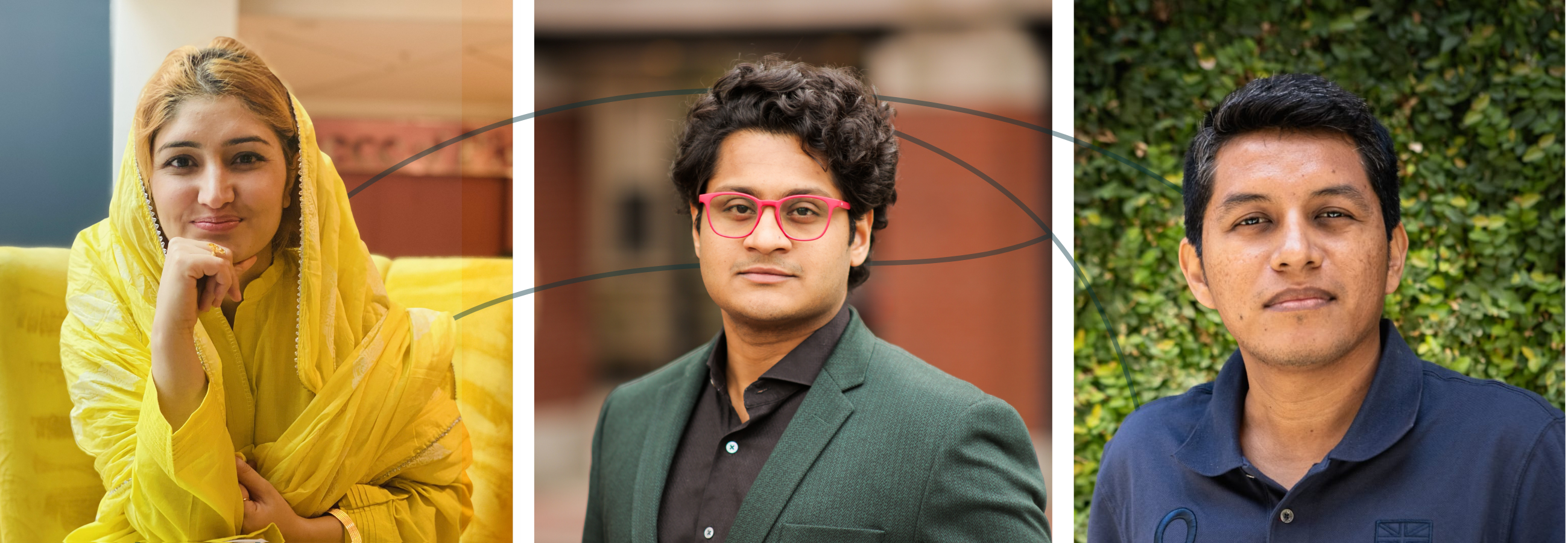
The One Young World Journalist of the Year Award recognises three of the world's most promising journalists aged 18 to 35. The award highlights the work of young journalists who are creating powerful and meaningful change, providing the essential means to ensure freedom of speech and ensuring human rights are justly upheld in all regions worldwide.
These 3 young journalists have all been selected as winners based on the influential work they have carried out in their countries and communities.
The winners were selected from a shortlist by One Young World’s expert judging panel and will be presented with this award at the One Young World 2025 Summit.
The Winners
Salma Niazi
Salma Niazi is the founder and Editor-in-Chief of The Afghan Times, an independent media outlet amplifying the voices of Afghan women. Based in Dublin, Ireland since January 2024, Salma continues her work in exile after being forced to flee Afghanistan in February 2022 following the Taliban's return to power. She remained in hiding in Pakistan for nearly two years before resettling in Ireland.
Despite these challenges, Salma has fearlessly sustained The Afghan Times, working with a courageous team of journalists and photographers inside Afghanistan who operate in secrecy. In April 2024, she launched the Open Mic Podcast, a groundbreaking platform where over 50 young Afghan women have shared personal stories of resilience. She also spearheaded two powerful magazine editions: “Women and Food Insecurity in Afghanistan” (October 2024, World Food Day) and “Locked Room: Afghan Women’s Voices” (March 2025, International Women’s Day).
Salma has trained a network of eight youth reporters and photographers, and remains connected to over 100 young women contributors across the country. Her work continues to inspire a new generation of Afghan journalists, offering a lifeline for truth, resistance, and women's voices under repression.
Nilesh Christopher
Nilesh Christopher is a journalist reporting on the societal impacts of technology and AI— how it empowers, harms, and reshapes communities.
Since 2020, he has consistently led the way in writing about AI’s misuse by the powerful: from exposing the first-ever use of deepfakes in an Indian election to investigating a high-profile politician who dismissed incriminating audio as a deepfake. When local institutions declined to assist, he partnered with forensic experts in the U.S. to investigate the clip, revealing a growing phenomenon called the “liar’s dividend.” His reporting drew international attention to this tactic, cited in U.S. Senate testimony and policy discussions on AI transparency, and spotlighted the need for AI detection tools to be made accessible to under-resourced newsrooms in the Global South.
In 2024, Nilesh's election coverage revealed how Indian political parties used synthetic voices and AI avatars for voter outreach— not just to deceive, but to reinforce beliefs. Besides politics, his reporting has also informed readers about AI’s impact on labour, revealed biases in AI image generators, and featured in exhibitions to raise public awareness. In 2019, his exposé on TikTok's role in amplifying caste-based violence in India led the platform to change their community guidelines.
Nilesh is a 2025 Nieman Fellow at Harvard. His stories have been published in WIRED, The Atlantic, the BBC, and Rest of World. His body of work has earned him numerous honours, including SOPA, SAJA, SABEW, and India’s highest journalism honour, the Ramnath Goenka Award for Excellence in Journalism.
Leandro Amaya Camacho
Leandro Amaya Camacho is a Peruvian journalist, descendant of the pre-Columbian Sechura culture. He specializes in the Amazon, Indigenous rights, the environment, oceans and tracing illegal economies. His work is known for a systemic and human-centred approach that seeks to understand territories from within in order to tell powerful and transformative stories.
His reporting has had a direct impact on the communities portrayed: several Indigenous leaders featured in his stories gained national visibility and were granted protection by the Peruvian state.
His accolades include the 2020 Young Journalist Award (Thomson Foundation and the Foreign Press Association, London) for two high-impact investigations: one uncovering irregular government negotiations for offshore oil drilling in northern Peru, and another exposing the contamination of children with heavy metals in Cerro de Pasco. In 2024, he received the Inter American Press Association’s (SIP) Excellence in Journalism Award (Environment category) for his coverage of Indigenous rights and environmental defenders in the Peruvian Amazon, and was a finalist for the IPYS National Grand Prize for Journalism for his reporting on the murders of environmental defenders in Peru — among other national distinctions.
Beyond his investigative work, he has mentored young journalists in workshops on investigative and environmental journalism, and has promoted community journalism networks in the Amazon and northern coast. He has spoken at conferences in Rio de Janeiro, Medellín, Lima, and other cities, sharing insights on traceability, criminal structures, and the role of independent journalism in defending democracy and protecting territories.